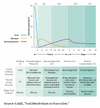Hi All,
The beginning of the New Year always seems like an auspicious time to do some longer fasting, osit, before the needs of the year begin to require significant amounts of attention. There are lots of ways to fast: dry fasting, juice fasting, the Master Cleanse, water fasting etc. This year, I'm going to try something a little different - a supplement-based fast. I've read that the fillers for supplements can somewhat interrupt the cleansing process that takes place while the digestive system is having some "downtime", so I don't want to go too far with it, and am thinking about a daily intake of the following:
Morning:
Afternoon:
Evening:
Filtered and sparkling mineral water throughout the day.
Intended duration: 7-14 days.
Any thoughts or suggestions regarding this?
The beginning of the New Year always seems like an auspicious time to do some longer fasting, osit, before the needs of the year begin to require significant amounts of attention. There are lots of ways to fast: dry fasting, juice fasting, the Master Cleanse, water fasting etc. This year, I'm going to try something a little different - a supplement-based fast. I've read that the fillers for supplements can somewhat interrupt the cleansing process that takes place while the digestive system is having some "downtime", so I don't want to go too far with it, and am thinking about a daily intake of the following:
Morning:
- Glass of filtered water with 1 x level teaspoon of Sodium Bicarbonate + 1 x level teaspoon of Celtic Sea Salt.
- 2,000 IU Vitamin D + K2.
- 1000mg NAC.
Afternoon:
- 1 x Vitamin B-Complex.
- 3-6g of Vitamin C as ascorbic acid powder, topped with 1-2g of Liposomal Vitamin C.
Evening:
- Glass of filtered water with 1 x heaped teaspoon of Magnesium Complex + 1 x level teaspoon of Sodium Bicarbonate.
- 100mg 5-HTP and 10mg time-release Melatonin before bed.
Filtered and sparkling mineral water throughout the day.
Intended duration: 7-14 days.
Any thoughts or suggestions regarding this?



